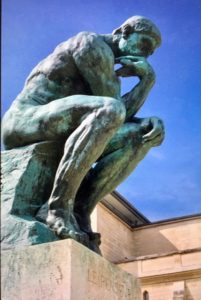If an explorer from another galaxy happened to visit the U.S. within the last few weeks, she would surely have been puzzled at one public reaction to the Coronavirus—rushing out and buying toilet paper in greater quantities than almost any other item. The explorer would wonder what about this small item made it more important than dietary staples such as meat, fish, bread, vegetables, and water. Could toilet paper be for Americans a form of deity or a related object of worship? Might it instead be a talisman or charm for protection against illness? Is the way humans use it the cause of its efficacy? Does the softness of which some packages boast increase toilet paper’s protectiveness against life-threatening assaults?
Lacking a human frame of reference, the explorer would find it difficult to answer these questions. Observant humans, if asked, would simply say “For some reason, many people are in the habit of acting without thinking!” This essay will discuss what that reason is, how it came to be, and how it has more broadly affected our country.
Thinking was never taught directly in past centuries, let alone made central to curriculums. Educators of that time affirmed its importance, but they didn’t know how to teach it, in many cases were convinced that it couldn’t be taught, and so settled for believing that their lectures and reading materials would miraculously inspire sound thinking in students.
During the first few decades of the twentieth century, a number of teachers discovered that thinking could indeed be taught. They also developed effective ways for teaching it. But then in mid-century, before their work was widely accepted and implemented, a new development undermined their efforts. That new development was humanistic psychology, notably the work of Carl Rogers and Abraham Maslow, which promoted the idea that feeling is more trustworthy than thinking and can enable us to create our own reality and truth. That idea was embraced by the fast-developing communications media and was widely promulgated in American culture in the 1960s.
In the 1970s and 1980s, an educational movement offered hope for breaking the emphasis on feeling and restoring thinking to prominence. It was known as the Critical Thinking movement and, drawing upon the work of the pioneers earlier in the century, it led to the development of special courses, first in colleges, and then in high schools. I was part of that movement and in my 1975 textbook Beyond Feelings: A Guide to Critical Thinking, I described the challenge as follows:
“[Today’s college student] has been conditioned not to undervalue subjectivity, but to overvalue it. And so he does not need to have his feelings indulged. Rather, he needs to be taught how to sort out his feelings, decide to what extent they have been shaped by external influences, and evaluate them carefully when they conflict among themselves or with the feelings of others. In short, he needs to be taught to think critically.”
Many of us in that movement attempted to go beyond creating courses in thinking and make thinking instruction a central part of every course in the curriculum. However, that larger effort failed.
In the late 1980s a movement that celebrated Self-Esteem began to undermine the emphasis on thinking instruction in both schools and colleges. The campaign for self-esteem was not really new, but instead an extension of a key idea in Abraham Maslow’s earlier “hierarchy of human needs.” That idea was that self-esteem is essential for achievement in school and in life. The Self-Esteem movement simply took Maslow’s idea to its logical conclusion: that education’s main focus should be on eliminating students’ self-doubt and self-questioning, as well as on shielding them from all criticism, including self-criticism.
For more than half a century, the emphasis in American education on trusting feelings more than thinking and valuing self-esteem more than intellectual skill has had devastating consequences for several generations of Americans. That emphasis has made many individuals unwilling and/or unable to distinguish helpful rational feelings from harmful irrational ones. It has also convinced them that even their most carelessly formed opinions, impressions and hunches are unquestionably true. And these deficiencies have caused them to regard anyone who holds a different view from theirs about any subject, especially important ones such as politics, religion, and education, as not only wrong but also malicious and therefore contemptible.
The cumulative effect of this dynamic duo of ignorance and arrogance is, I believe, an important cause of division in America. Even to begin to address what can be done to overcome it will require more space than is available here.
In closing, let me explain why I chose the title and the lead-in to this essay. First, because the toilet paper “saga” was, from all indications, a national phenomenon that most readers are familiar with. Secondly, because it actually reminded me of the lamentable triumph of feeling over reason that has for so long brought harm to so many. Finally, because I believe Christopher Morley was wise in claiming, “Humor is perhaps a sense of intellectual perspective: an awareness that some things are really important, others not; and that the two kinds are most oddly jumbled in everyday affairs.”
To Be Continued . . .
Copyright ©2020 by Vincent Ryan Ruggiero. All rights reserved




